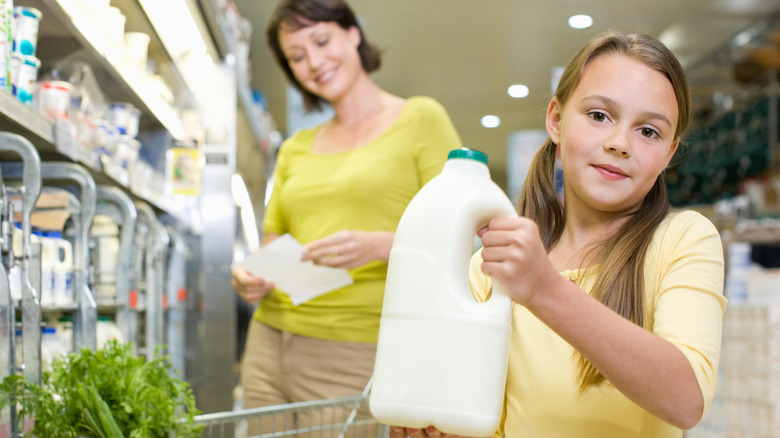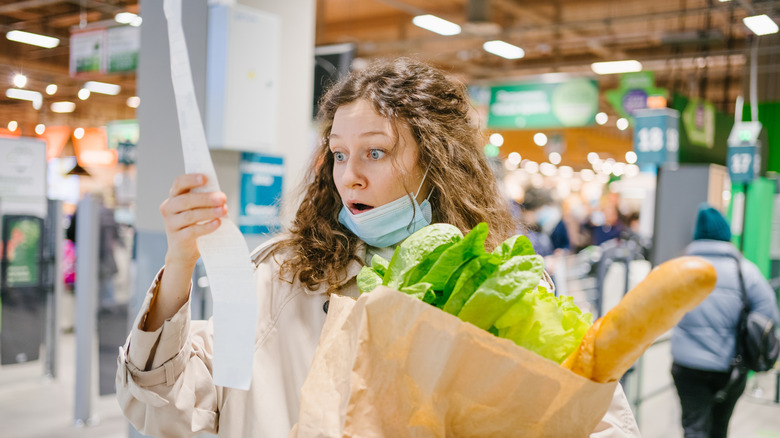The Popular Beverage You Should Avoid Buying At Costco If You Don't Want To Waste Money
According to the U.S. Bureau of Labor Statistics, the average cost of groceries rose by 1.9% between August 2024 and February 2025. Where milk is concerned, prices have gone up steadily from an average $3.87 per gallon in April 2024, to an average $4.03 in April 2025. As per analysis of the 2023 U.S. Census Bureau Household Pulse Survey, households in the U.S. were spending an average of $270.21 a week on groceries, or roughly $1,080 per month. Since every little bit you can save on groceries helps your household budget — particularly with a tariff war raising the cost of other grocery items like meat, seafood, olive oil, produce, coffee and alcohol — you should be a little more mindful of where and how you buy your milk.
While Costco has been a success story precisely because of how much it can save you in bulk, thinking that way about milk is a Costco shopping mistake that will cost you for a few simple reasons. These extend to plant-based alternative milks like almond, pea, or soy milks, since you may end up encountering the same — or worse — cost issues with those products as you will with dairy-based milk.
Buying milk in bulk at Costco is a waste of money
The U.S. tosses away close to 60 million tons of food every year, close to 40% of our total U.S. food supply. That's the equivalent of 325 pounds of food per person. This gives the U.S. the unfortunate designation of being the number one creator of food waste in the world, with an average value of $218 billion worth of food thrown out every year.
Milk is generally still safe to consume a few days after the sell-by date. The optimal length of time to consume raw milk is seven days past the sell-by date. Pasteurized milk past its sell-by date can last for up to seven days unopened but could spoil within three days once opened. The average American drinks roughly 2/3 of a cup of milk per day, which, according to the United States Department of Agriculture (USDA), places 90% of the U.S. population well below the USDA recommendation of two to three cups per day. Put simply, unless you have a large family of milk lovers, you aren't likely to finish a Costco-sized portion of milk before it spoils, making this one of the most costly mistakes losing you money at Costco.
Plant-based alternatives last a little longer but cost a lot more
In terms of longevity, pasteurized almond milk will last between seven and 10 days in your refrigerator once opened. Not much better than whole milk. However, shelf-stable almond milk will survive anywhere from 30 days to two months unopened outside of your refrigerator. Once opened it can go off in 10 days. Using Ripple Foods refrigerated and shelf-stable pea milks as a guide, pea milks have relatively the same survival rate of seven to 10 days, but will give you an extra 30 days in your refrigerator. Once it's opened however, the company suggests consuming it within seven to 10 days, too. Refrigerated and shelf-stable soy milk also lasts seven to 10 days. So plant-based alternatives don't appear to be much better than dairy in terms of longevity once opened.
According to Sentient Health, they are typically more expensive too. On average, alternative milk products cost $7.27 per gallon, which by comparison to the $4.03 average cost of milk as of April 2025, will cost you an extra $3.24 at the store. Currently, Costco is selling a 12-pack of quart-size almond milk for $15.69, or $1.31 per quart. It's definitely a steal at face value. Of course, this is one of Costco's sneaky ways to trick you into spending more money on groceries, with the odds of you drinking three gallons of milk before it spoils being low to nil.


